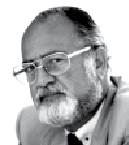Antoine Boutros - Ethics and Deeds
He who wrote this verse, may God rest his soul.
Was he a poet, a jurisprudent or a scholar? That delicate human who was concerned about ‘the recurrent downpour of afflictions and the tumbling waves of sorrows;’ the man sought by his fellows in their quest for ‘words on how to approach God, seek proximity to Him and demand that He be pleased with them;’ he who, despite his utter weakness and ruffled mind, accepted their solicitation and guided them on how to observe the ‘light emanating from the greatness of their Beloved One. ‘
Our companion is Kazim Ibn Qassim al-Husseini Al-Rashti from the Al-Rasht towns in Iraq. He was 25 years old when he first wrote the Letter of Conduct for Ethics and Deeds. His ancestral library was one of the largest scientific libraries in Iraq.
Recently, the German Orient Institute of Beirut has bestowed upon us this letter realized by Dr. Wahid Bahmardi, a professor at the AUB’s Department of Arabic and Near Eastern Language, who premised his work on three manuscripts of this letter.
According to its compiler, the letter falls under those works addressing ethics in terms of worship and conduct. He does not put forth an ethical philosophy but rather an opinion on ethics that is predicated on religious not philosophical principles and aims to strictly implement Sharia’a in order to reach happiness in this life and the afterlife and uncover the moral truths, all while abiding by the Sharia’a. However, this opinion contradicts the Sufi opinion, which holds that ‘if the truths are revealed, the laws will cease to be’, irrespective of the elevated stages that the seeker of the truth might reach in the ranks of the science of the truth.
“God Almighty is the ultimate cause of all causes and the reason behind all reasons without a reason,” is perhaps one of Al-Rashti’s most rational and fascinating sayings, for it sums up several debates that challenge the thought at all times and ages. Let then no one debate this matter, for God has created for all things both a general and a specific cause and ‘we do not need Imams because the Quran reveals everything.”
However, these words raised the ire of scholars who maintained that there should be religious authorities for the believers to look up to and model after and that said authorities should be responsible for guiding every detail of the lives of believers according to the principle of promotion of virtue and prevention of vice.
The moral objective of the letter was to draw attention to the fact that ‘humans have become so absorbed by the languor of bygone that their tempers have frozen and their instincts have been smothered. The flames of longing to God have been extinguished in their heart but the fire must be ignited again and the dust must be removed.
To think about the greatness of God and the humility of the soul is the first foray into the path towards God. The seeker must be conscious of what inflames his spirit and must always look for the greatness of God in his heart. When one compares themselves to lofty mountains, they look like a tiny particle in contrast. If, instead, they are on mountain top, they see everything smaller as they look down. However, when compared to the earth, the loftiest of mountains would be about one seventh the average width of a human hair compared to a ball of a 1-cubit diameter. The earth itself is 180 times smaller than the sun and hangs suspended somewhere in the universe. In the scope of the universe, the earth is insignificant. If the man, compared to mountains, is dwarfed and mountains, compared to the earth, are dwarfed, and the earth is in turn dwarfed by the universe, and the universe dwindles at the seat of God which again looks dwindled before the throne, then what of man before the greatness of his creator! How small and imperceptible is the standing of man compared to all those small perishable creatures.
The seeker must look inward and contemplate the humility of the self. He must seek what inflames his spirit and search for the greatness of God in his heart. If he looks into his body and digs beneath his skin, he will find nothing pure or pleasant. All that he discharges is either filthy such as urine, excrement, blood and sperm or viscous and malignant such as pus and saliva. Let everyone look at how those delicious and aromatic foods end up after they are consumed and masticated. If they spit them out of their mouths, they would never put any bite back in.
Let them reflect on the sin of the spirit. How come they conceal their evil deeds from people but do not conceal them from God! How come they notice the greatness of man but fail to notice that of his creator! Let the seeker know that the worth of man, his time, day and hour will all be marked and carved by his deeds much like everything else in the world and those deeds will be kept in the preserved tablet (Al-Lawh Al-Mahfouz) in the book of God until the Qiyamah Day.
The discovery of the required conduct to rekindle the fiery divine flames will not be completed except by persevering to think and seek knowledge and truth.








Leave A Comment